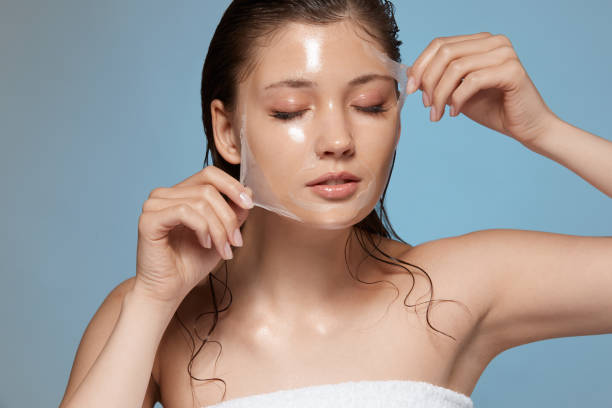Chemical peels in Abu Dhabi have become a popular choice for individuals seeking to rejuvenate their skin and address various dermatological concerns. In Abu Dhabi, where skincare and beauty standards are high, the demand for advanced techniques like chemical peels is on the rise. Let's delve into what chemical peels entail and how they can transform your skin.
Introduction to Chemical Peels
Chemical peels involve the application of a chemical solution to the skin, which exfoliates the outer layer, revealing smoother, clearer skin underneath. This non-invasive procedure is performed by dermatologists or licensed skincare professionals.
Types of Chemical Peels
There are different types of chemical peels available, ranging from superficial to deep, depending on the depth of penetration and the intensity of the solution used.
- Superficial peels: These peels are gentle and primarily target the outer layer of the skin, addressing minor imperfections and providing a refreshing glow.
- Medium peels: Medium-depth peels penetrate deeper into the skin, targeting moderate skin issues such as acne scars and uneven pigmentation.
- Deep peels: Reserved for more severe concerns, deep peels reach the middle layer of the skin, effectively treating deep wrinkles and significant sun damage.
Benefits of Chemical Peels
Chemical peels offer a wide range of benefits, making them a versatile treatment option for various skin concerns.
- Improving skin texture: Chemical peels help smooth out rough skin texture, leaving it soft and supple.
- Treating acne and acne scars: By unclogging pores and reducing inflammation, chemical peels can improve acne and fade acne scars.
- Reducing hyperpigmentation: Peels containing ingredients like glycolic acid or kojic acid can lighten dark spots and even out skin tone.
Preparation for Chemical Peel Treatment
Before undergoing a chemical peel, it's essential to consult with a dermatologist to determine the most suitable type of peel for your skin type and concerns. Additionally, preparing the skin beforehand by avoiding sun exposure and discontinuing certain skincare products is necessary for optimal results.
The Chemical Peel Procedure
During the procedure, the skin is cleansed, and the chemical solution is applied evenly. The solution is left on for a specified period, during which patients may experience a tingling or burning sensation. After the designated time, the solution is neutralized, and a soothing cream or mask may be applied to alleviate any discomfort.
Aftercare and Maintenance
Following a chemical peel, proper aftercare is crucial for promoting healing and maintaining results. This includes adhering to a gentle skincare routine, avoiding sun exposure, and using sunscreen diligently to protect the skin from UV damage.
Expected Results and Duration
The results of a chemical peel are typically noticeable immediately after the treatment, with continued improvement over the following weeks as the skin heals and regenerates. Depending on the depth of the peel, the effects can last for several months to years.
Safety Considerations
While chemical peels are generally safe when performed by trained professionals, there are some risks and potential side effects to be aware of. These may include redness, swelling, peeling, and in rare cases, scarring or infection. Individuals with certain skin conditions or sensitivities may not be suitable candidates for chemical peels.
Cost of Chemical Peel Treatment in Abu Dhabi
The cost of chemical peel treatment in Abu Dhabi can vary depending on several factors, including the type of peel, the clinic's reputation, and the expertise of the practitioner. However, compared to other cosmetic procedures, chemical peels are often more affordable and provide excellent value for the results achieved.
Choosing the Right Clinic
When considering a chemical peel treatment, it's essential to research reputable clinics that specialize in skincare and dermatology. Reading reviews and testimonials from previous clients can help gauge the quality of service and results offered by each clinic.
Testimonials and Success Stories
Real-life testimonials and success stories from individuals who have undergone chemical peel treatments can provide valuable insights and reassurance for those considering the procedure. Before-and-after photos showcasing visible improvements in skin texture, tone, and clarity can inspire confidence in the treatment's efficacy.
FAQs about Chemical Peels
What skin concerns can chemical peels address?
Chemical peels can effectively treat a variety of skin concerns, including acne, acne scars, hyperpigmentation, uneven skin tone, and fine lines and wrinkles.
How often should I get a chemical peel?
The frequency of chemical peel treatments depends on factors such as the type of peel used and individual skin sensitivity. Generally, superficial peels can be done every 2-4 weeks, while deeper peels may require longer intervals between sessions.
Are chemical peels suitable for all skin types?
While chemical peels can benefit many skin types, individuals with certain conditions such as eczema, rosacea, or active infections may not be suitable candidates. It's essential to consult with a dermatologist to assess your skin's suitability for the treatment.
Can I wear makeup after a chemical peel?
It's best to avoid wearing makeup immediately after a chemical peel to allow the skin to heal properly. Once any peeling or redness has subsided, makeup can be safely applied.
Are there any side effects of chemical peels?
Common side effects of chemical peels include temporary redness, swelling, and peeling of the skin. These effects typically subside within a few days to a week after the treatment.





Comments